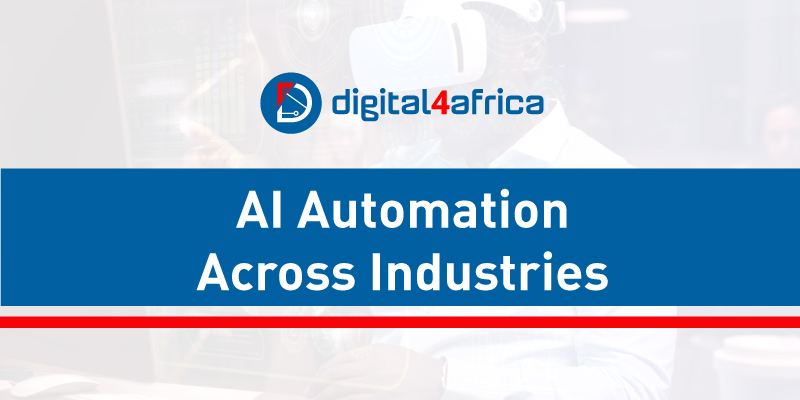AI Automation Across Industries: Boost Efficiency & Quality
Artificial intelligence (AI) is the ability of machines to perform tasks that normally require human intelligence, such as reasoning, learning, decision making, and problem solving. AI has been advancing rapidly in recent years, thanks to the availability of large amounts of data, powerful computing resources, and sophisticated algorithms. AI has the potential to automate many human tasks across various domains, such as manufacturing, customer service, healthcare, finance, and trading. In this essay, I will explore some of the amazing ways AI can automate human tasks, as well as some of the important considerations and challenges that come with AI automation.
AI Automation in Manufacturing and Industrial Processes
-
Quality Control
AI-powered cameras and sensors can meticulously inspect products on assembly lines. They identify defects, inconsistencies, or potential issues more efficiently and reliably than human inspectors. This is especially important in high-precision manufacturing for electronics or medical devices. For example, IBM’s Visual Insights uses AI to detect defects in products such as circuit boards, fabrics, or food items.
-
Predictive Maintenance
AI analyzes sensor data from machinery to predict potential breakdowns. The system can preemptively schedule repairs or replacements, preventing costly downtime. For example, Siemens uses AI to monitor the health of its gas turbines and optimize their performance and maintenance.
-
Inventory Optimization
AI models forecast demand, analyze sales patterns, and manage stock levels. This reduces waste and ensures the right products are available at the right time. For example, Walmart uses AI to optimize its inventory management and replenishment across its stores and warehouses.
-
Process Automation
AI can automate repetitive or complex tasks in manufacturing processes, such as welding, assembling, or packaging. This improves productivity, quality, and safety. For example, BMW uses AI-powered robots to assist its workers in various tasks, such as installing sound insulation or applying glue.
Has AI Automation Improve Customer Service?
-
Chatbots
Many websites and apps now use AI chatbots as the first line of customer support. They handle basic questions (“What are your store hours?”), troubleshoot simple problems, and gather information to pass to human agents for complex inquiries. This frees up customer service staff for higher-level concerns. For example, Sephora uses an AI chatbot to provide personalized beauty advice and product recommendations to its customers.
-
Voice Assistants
AI-powered voice assistants can assist with tasks like booking appointments, ordering products, and controlling smart home devices. While not flawless, they’re becoming increasingly capable without relying on constant human intervention. For example, Amazon’s Alexa can help customers shop online, play music, set reminders, and more.
-
Sentiment Analysis
AI can analyze the tone and emotion of customer interactions, such as voice calls, emails, or social media posts. This can help customer service agents understand the customer’s mood, satisfaction, and needs, and tailor their responses accordingly. For example, Cogito uses AI to provide real-time feedback and guidance to customer service agents based on the customer’s vocal cues.
-
Personalization
AI can use customer data, such as browsing history, purchase behavior, or preferences, to provide personalized offers, recommendations, and experiences. This can increase customer loyalty, retention, and revenue. For example, Netflix uses AI to personalize its content recommendations and thumbnails for each user based on their viewing habits and interests.
AI Automation in Healthcare
-
Medical Imaging Analysis
AI systems are trained on massive datasets of medical images (X-rays, CT scans, MRIs). They can then identify potential abnormalities like tumors or fractures that might be missed by human radiologists. This doesn’t eliminate the need for doctors, but acts as a powerful second opinion. For example, Google’s DeepMind uses AI to detect eye diseases from retinal scans with high accuracy and speed.
-
Drug Discovery
AI speeds up the drug discovery process by sifting through vast amounts of chemical and biological data to identify potential drug candidates. This accelerates research, especially in the early stages of identifying potential solutions. For example, Atomwise uses AI to screen millions of molecules for potential drugs and predict their efficacy and toxicity.
-
Diagnosis and Treatment
AI can use patient data, such as symptoms, medical history, or test results, to diagnose diseases and suggest treatments. This can improve the accuracy and efficiency of healthcare delivery and reduce human errors. For example, Babylon Health uses AI to provide health assessments and triage services to its users via a mobile app.
-
Remote Monitoring and Care
AI can enable remote monitoring and care of patients, especially those with chronic conditions or elderly people. AI can use wearable devices, sensors, or smart home systems to collect and analyze data on the patient’s vital signs, activity, or behavior. AI can then alert the patient or the caregiver if there is any anomaly or emergency. For example, CarePredict uses AI to monitor the well-being and safety of senior citizens living independently or in assisted living facilities.
AI Automation in Finance and Trading
-
Fraud Detection
AI is very adept at analyzing patterns in financial transactions. It spots anomalies that could indicate fraud, often with far more accuracy than systems relying purely on human-set rules. For example, PayPal uses AI to detect and prevent fraudulent transactions on its platform, saving millions of dollars in losses.
-
Algorithmic Trading
AI strategies buy and sell stocks (or other assets) at lightning speed based on market conditions. Human traders can set overall parameters, but the AI makes the real-time decisions autonomously. For example, Sentient Technologies uses AI to trade stocks, currencies, and commodities, using evolutionary algorithms to learn from its successes and failures.
-
Credit Scoring
AI can use alternative data sources, such as social media, online behavior, or mobile data, to assess the creditworthiness of borrowers, especially those who lack traditional credit history. This can increase financial inclusion and reduce default rates. For example, Lenddo uses AI to provide credit scoring and verification services to lenders in emerging markets.
-
Wealth Management
AI can provide personalized financial advice and portfolio management to investors, based on their goals, risk appetite, and preferences. AI can also use natural language processing to understand and respond to investor queries. For example, Wealthfront uses AI to offer automated investment and financial planning services to its clients.
Content Creation Skyrockets with AI Automation
AI can also automate various aspects of content creation, such as writing articles, blogs, social media posts, and more. AI can help content creators with tasks such as:
-
Generating ideas and headlines
AI can use natural language processing and data analysis to generate catchy and relevant headlines, titles, or topics for content. For example, StoryChief uses AI to generate converting headlines for blog posts and social media posts.
-
Writing and editing content
AI can use natural language generation and deep learning to write and edit content, such as blog posts, product descriptions, or ad copy. AI can also use natural language understanding and sentiment analysis to ensure the content is coherent, engaging, and appropriate for the target audience. For example, SimpleTiger uses AI to write and optimize content for SEO and conversions.
-
Enhancing content with visuals
AI can use computer vision and generative adversarial networks to create and enhance visuals, such as images, videos, or graphics, for content. AI can also use natural language processing and image recognition to match visuals with text content. For example, Deloitte uses AI to generate visuals for its reports and presentations.
AI Companies in Africa
Here are some examples of companies in Africa that have seen success in using AI to automate tasks and increase efficiency:
-
Agrix Tech
This Cameroon-based startup helps small-scale farmers diagnose plant diseases and pests using a mobile app that scans the leaves and provides suggestions for treatment. The app works offline and supports multiple local languages.
-
SunCulture
This Kenyan company provides precision irrigation solutions for farmers using solar power and AI. The app collects and analyzes local soil and weather data, and gives recommendations on irrigation, fertilization, and pest control.
-
Curacel
This Ghanaian startup offers an AI-powered platform for claims processing and fraud management in the insurance sector. The platform automates claims verification, detects fraudulent claims, and reduces operational costs.
-
Convertedin
This Egyptian startup is an automation ads platform for e-commerce and online sellers. The platform uses AI to optimize ad campaigns, target the right audience, and increase conversions.
-
Yemaachi Biotechnology
This Ghanaian biotech company is working to lower the economic burden of cancer by using AI to analyze genomic data and provide personalized treatment options.
Important Considerations
-
Not All Tasks
Not every task is suitable for complete AI automation. Tasks with high ethical implications, complex judgment calls, or those requiring a deep human connection still necessitate human involvement. For example, AI cannot replace human doctors, lawyers, or teachers, but can only assist them with certain aspects of their work.
-
The Need for Training
AI models need robust training data and careful design to achieve the desired accuracy. Bias in the data can lead to undesirable results, such as discrimination, unfairness, or inaccuracy. For example, Amazon had to scrap its AI recruitment tool because it was biased against women.
-
Continuous Oversight
Even the best AI systems require monitoring. Humans need to supervise to ensure the systems are performing as expected and adjust them if necessary. For example, Uber had to suspend its self-driving car program after a fatal accident involving one of its vehicles.
Has AI Automation Across Industries Boosted Efficiency & Quality?
AI automation is transforming various tasks and processes across different industries and domains. AI can take over certain tasks traditionally done by humans, operating without human intervention to ensure accuracy, efficiency, and quality.
However, AI automation also poses some challenges and limitations, such as ethical, social, and technical issues. Therefore, it is important to balance the benefits and risks of AI automation, and to use it as a complement, not a substitute, for human intelligence and creativity. AI automation is not a threat to human workers, but an opportunity to enhance their skills, productivity, and innovation.
By Francis Waithaka. Ideas researched with the help of Copilot and Gemini.


